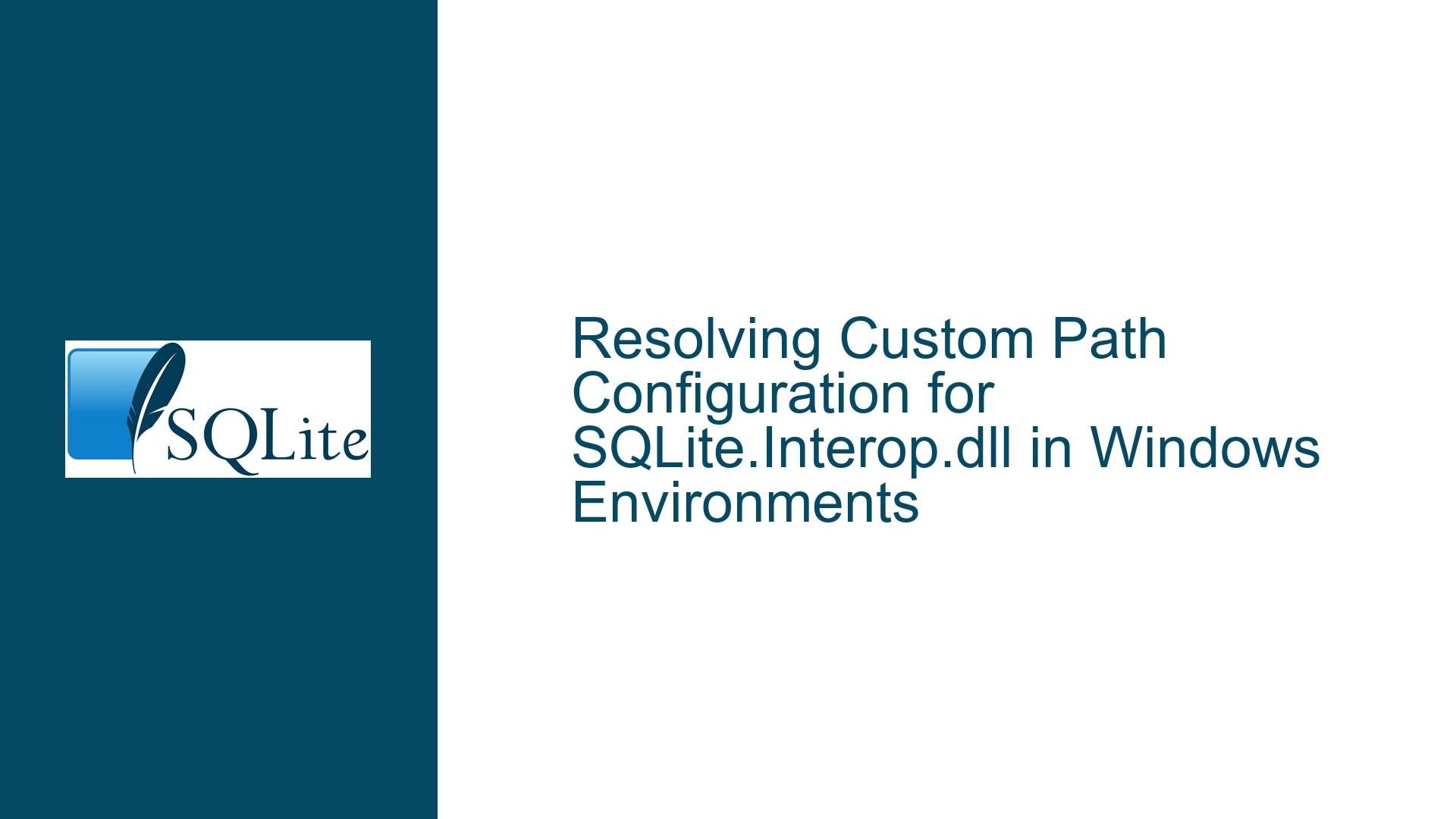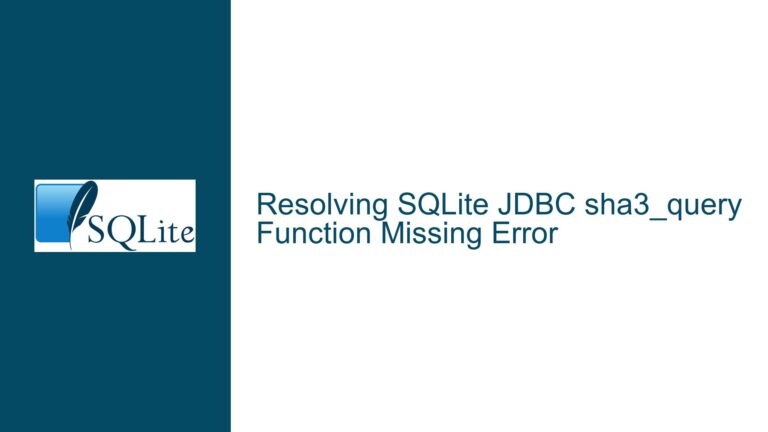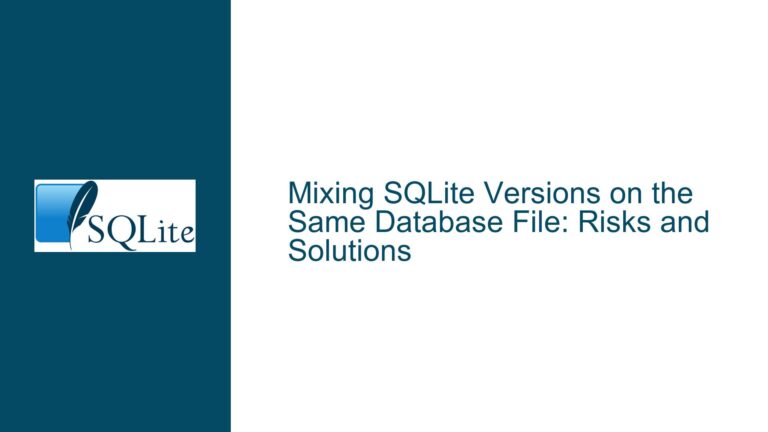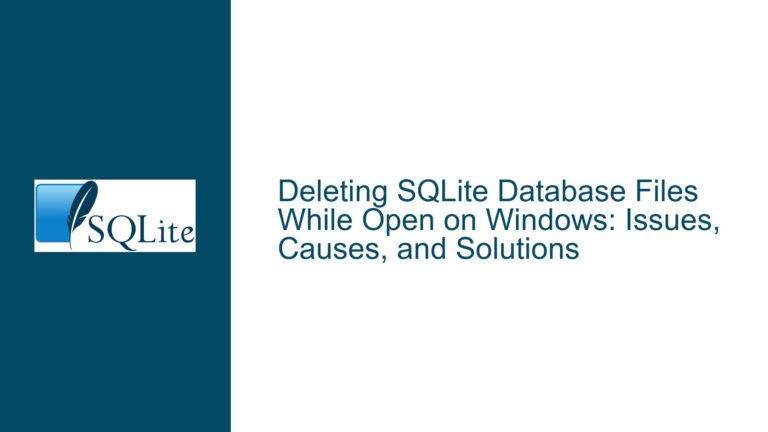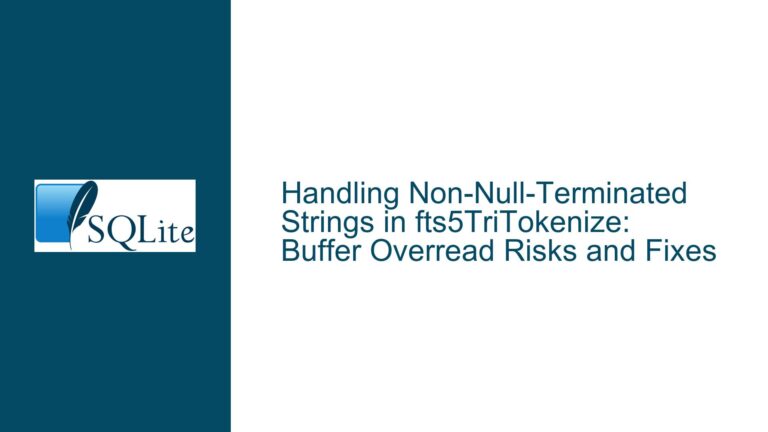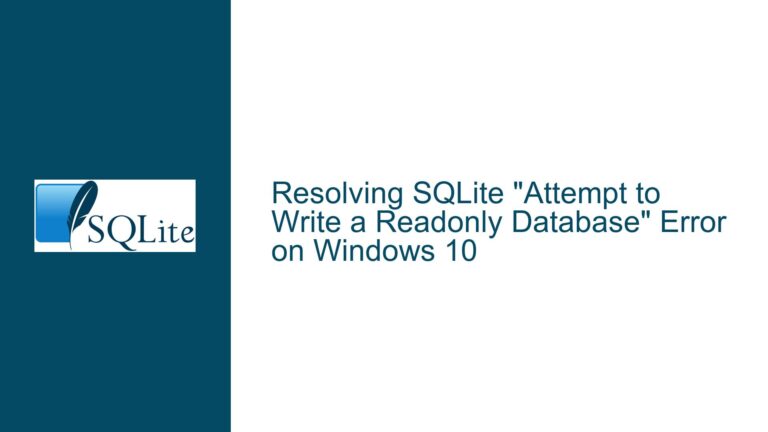Resolving Custom Path Configuration for SQLite.Interop.dll in Windows Environments
Understanding the SQLite.Interop.dll Dependency Loading Mechanism in Windows Applications
The SQLite.Interop.dll is a critical component of the SQLite database engine when using the ADO.NET provider or other language bindings that rely on native interoperability. This unmanaged DLL handles low-level operations, and its correct loading is essential for applications leveraging SQLite. A common challenge arises when developers need to control the physical location of this DLL due to deployment constraints, architectural mismatches, or versioning conflicts. Windows enforces a strict search order for locating DLLs, which can conflict with application-specific directory structures or deployment strategies. The inability to explicitly specify a custom path for SQLite.Interop.dll leads to runtime errors like "Unable to load DLL ‘SQLite.Interop.dll’" or "The specified module could not be found," particularly when the DLL resides outside standard search locations.
The complexity stems from Windows’ DLL loading semantics, which prioritize system directories, application directories, and PATH environment variables over developer-defined locations. Applications using mixed-mode assemblies or plugin architectures often require granular control over DLL resolution. SQLite.Interop.dll presents unique challenges because it is architecture-specific (x86/x64/ARM64) and must reside in subdirectories matching the target platform when using default loading behavior. Deviations from this structure necessitate explicit intervention in the DLL search process. The problem intensifies in scenarios involving multiple installed SQLite versions, custom deployment packages, or security-restricted environments where writing to system directories is prohibited.
Root Causes of SQLite.Interop.dll Loading Failures and Path Resolution Conflicts
Windows DLL Search Order Precedence Rules
The operating system follows a deterministic sequence when resolving DLL dependencies:
- Loaded module directory (if dynamically loaded via API)
- System directories (System32, SysWOW64)
- 16-bit system directory (Windows only)
- Windows directory
- Current working directory
- Directories listed in PATH environment variable
SQLite.Interop.dll typically requires placement in architecture-specific subdirectories (e.g., \x86, \x64) relative to the main application executable. When developers attempt to centralize DLL storage or use version-specific paths outside this hierarchy, the default search algorithm fails to locate the file. This becomes acute in multi-tenant applications or when side-by-side deployment of multiple SQLite versions is required.
Multiple DLL Copies and Versioning Ambiguities
Conflicts arise when duplicate SQLite.Interop.dll files exist across different search locations. Windows will load the first matching DLL found in the search order, which may not be the intended version. This is particularly problematic when:
- Global assembly cache (GAC) contains outdated versions
- Developer workstations have residual DLLs from previous installations
- Third-party components bundle their own SQLite.Interop.dll
- CI/CD pipelines generate artifacts with inconsistent file structures
Incorrect Platform Target Configuration
Mismatches between the application’s build configuration (x86 vs. x64 vs. AnyCPU) and the physical location of SQLite.Interop.dll create loading failures. For AnyCPU assemblies running in 64-bit mode, the runtime expects the DLL in \x64 subdirectories, while 32-bit mode requires \x86. Applications not following this convention must override the default search logic.
Security Software Interference
Antivirus programs and application control policies may block DLL loading from non-standard paths, even if the developer explicitly specifies them. This manifests as silent failures where the DLL appears present but cannot be mapped into the process address space.
Redirection to Virtual Store
On Windows systems with User Account Control (UAC) enabled, attempts to write to Program Files or other protected directories may redirect SQLite.Interop.dll to the VirtualStore (%LOCALAPPDATA%\VirtualStore), causing version mismatches between installed and runtime-loaded components.
Comprehensive Strategies for Custom SQLite.Interop.dll Path Configuration
Modifying the DLL Search Path at Runtime
For .NET applications, inject custom directory paths into the DLL search sequence before initializing SQLite:
using System.Runtime.InteropServices;
public class NativeMethods
{
[DllImport("kernel32.dll", CharSet = CharSet.Unicode, SetLastError = true)]
[return: MarshalAs(UnmanagedType.Bool)]
public static extern bool SetDllDirectory(string lpPathName);
[DllImport("kernel32.dll", CharSet = CharSet.Unicode, SetLastError = true)]
public static extern void AddDllDirectory(string lpPathName);
}
// During application startup
string customPath = @"D:\App\SqliteLibraries\x64";
NativeMethods.SetDllDirectory(customPath);
NativeMethods.AddDllDirectory(customPath);
Combine with explicit load context specification for mixed-mode assemblies:
Assembly assembly = Assembly.LoadFrom("System.Data.SQLite.dll");
NativeLibrary.SetDllImportResolver(assembly, (name, assembly, path) =>
{
if (name == "SQLite.Interop.dll")
{
return NativeLibrary.Load(Path.Combine(customPath, name));
}
return IntPtr.Zero;
});
Architecture-Specific Directory Structure Overrides
Force SQLite to recognize non-standard platform subdirectories by setting environment variables before component initialization:
Environment.SetEnvironmentVariable("SQLITE_INTEROP_DIR", @"C:\Libraries\SQLite\Custom\x64");
Implement a custom resolver that maps platform identifiers to physical paths:
SQLiteConnection.SetConfig(SQLiteConfigOption.SQLITE_CONFIG_URI, 1);
SQLiteConnection.AddConnectionHook((eventType, args) =>
{
if (eventType == SQLiteConnectionEventType.Profile)
{
string archPath = Environment.Is64BitProcess ? @"\x64" : @"\x86";
string fullPath = Path.Combine(Environment.GetEnvironmentVariable("SQLITE_CUSTOM_ROOT"), archPath);
SQLite3.SetDirectory(/*SQLiteDirType*/2, fullPath); // SQLITE_DIRECTORY_LIBRARY
}
});
Fusion Logging and Loader Diagnostics
Enable Windows loader snapshots to trace DLL resolution failures:
Process Monitor Configuration
- Launch procmon.exe from Sysinternals
- Set filters:
- Operation is CreateFile
- Path contains SQLite.Interop.dll
- Result is NAME NOT FOUND
Global Flags Editor (gflags.exe)
- Enable loader snaps:
gflags /i yourapp.exe +sls - Analyze logs at %WINDIR%\System32\LogFiles\Slb\
- Enable loader snaps:
Dependency Walker Profiling
- Profile application execution to capture exact load order and dependency chain
Side-by-Side Manifest Configuration
Force specific SQLite.Interop.dll versions using application manifests:
<?xml version="1.0" encoding="UTF-8" standalone="yes"?>
<assembly manifestVersion="1.0" xmlns="urn:schemas-microsoft-com:asm.v1">
<dependency>
<dependentAssembly>
<assemblyIdentity
type="win32"
name="SQLite.Interop"
version="3.45.1.0"
processorArchitecture="x64"
publicKeyToken="<token>"/>
</dependentAssembly>
</dependency>
<file name="SQLite.Interop.dll" loadFrom="C:\CustomPath\x64\SQLite.Interop.dll" />
</assembly>
AppDomain Assembly Resolution Overrides
Intercept assembly loading events to redirect SQLite.Interop.dll:
AppDomain.CurrentDomain.AssemblyResolve += (sender, args) =>
{
if (args.Name.StartsWith("SQLite.Interop,"))
{
string arch = Environment.Is64BitProcess ? "x64" : "x86";
string path = Path.Combine(AppDomain.CurrentDomain.BaseDirectory,
"CustomLibraries", arch, "SQLite.Interop.dll");
return Assembly.LoadFrom(path);
}
return null;
};
Hybrid Configuration with Native Symlinks
Create junction points or symbolic links to bridge between expected and actual paths:
mklink /J "%APPDIR%\x64" "D:\GlobalSQLite\v3.45\x64"
mklink /J "%APPDIR%\x86" "E:\NetworkShare\SQLite\x86"
Combine with access control list (ACL) adjustments to permit cross-device linking.
Custom Loader Initialization via COM Activation
Implement a custom COM server that manages SQLite.Interop.dll loading:
Register CLSID with custom InProcServer32 path:
[HKEY_CLASSES_ROOT\CLSID\{YourCLSID}\InProcServer32] @="C:\\Loader\\ProxyDll.dll" "ThreadingModel"="Both"ProxyDll implementation:
STDAPI DllGetClassObject(REFCLSID rclsid, REFIID riid, LPVOID* ppv) { HMODULE hSqlite = LoadLibraryEx(L"C:\\TargetPath\\SQLite.Interop.dll", NULL, LOAD_WITH_ALTERED_SEARCH_PATH); // Forward to actual SQLite COM exports return GetProcAddress(hSqlite, "DllGetClassObject")(rclsid, riid, ppv); }
Installation Scope Isolation
For system-wide deployment scenarios, leverage Windows Side-by-Side (WinSxS) manifests:
Create assembly manifest for SQLite.Interop:
<?xml version="1.0" encoding="UTF-8"?> <assembly xmlns="urn:schemas-microsoft-com:asm.v1" manifestVersion="1.0"> <assemblyIdentity name="SQLite.Interop" version="3.45.1.0" processorArchitecture="x64" type="win32"/> <file name="SQLite.Interop.dll"/> </assembly>Install into WinSxS store:
md C:\Windows\WinSxS\x64_SQLite.Interop_31bf3856ad364e35_3.45.1.0_none_<hash> copy SQLite.Interop.dll C:\Windows\WinSxS\x64_...\Reference from application manifest:
<dependency> <dependentAssembly> <assemblyIdentity type="win32" name="SQLite.Interop" version="3.45.1.0" processorArchitecture="x64" publicKeyToken="0000000000000000"/> </dependentAssembly> </dependency>
Containerization and Virtualization
Package SQLite.Interop.dll with application virtualization technologies:
Microsoft App-V
- Sequence application with SQLite.Interop.dll in virtual filesystem
- Configure virtual registry entries for DLL path overrides
Docker Containerization
- Build Windows container image with precise DLL layout:
FROM mcr.microsoft.com/dotnet/runtime:6.0-windowsservercore-ltsc2022 COPY CustomDLLs/x64/SQLite.Interop.dll C:/App/x64/ ENV PATH=${PATH};C:\App\x64
- Build Windows container image with precise DLL layout:
VM-Based Sandboxing
- Isolate legacy applications using Hyper-V with dedicated virtual disks containing specific SQLite.Interop.dll versions
Security Policy Adjustments
Modify group policies and code integrity rules to permit custom paths:
Windows Defender Application Control (WDAC)
- Authorize DLLs via XML policy:
<FileRules> <Allow ID="ID_ALLOW_SQLITE_INTEROP" FriendlyName="SQLite.Interop.dll" FileName="SQLITE.INTEROP.DLL" MinimumFileVersion="3.45.1.0"/> </FileRules> <SigningScenarios> <SigningScenario Value="131" ID="ID_SIGNING_SCENARIO_1" FriendlyName="SQLite"> <ProductSigners> <FileRulesRef> <FileRuleRef RuleID="ID_ALLOW_SQLITE_INTEROP"/> </FileRulesRef> </ProductSigners> </SigningScenario> </SigningScenarios>
- Authorize DLLs via XML policy:
AppLocker DLL Rules
- Create path-based exception rules:
New-AppLockerPolicy -RuleType Path -Action Allow -Path "C:\CustomDLLs\*\SQLite.Interop.dll"
- Create path-based exception rules:
Version Resource Manipulation
Embed custom metadata to differentiate DLL instances:
Modify version info via Resource Hacker:
- Change FileVersion, ProductName, CompanyName fields
- Add custom resource entries for identification
Query version in code before loading:
FileVersionInfo info = FileVersionInfo.GetVersionInfo(dllPath); if (info.FileMajorPart != 3 || info.FileMinorPart != 45) throw new InvalidOperationException("Incompatible SQLite.Interop version");
Debugging Techniques for Load-Time Failures
Advanced diagnostic procedures for unresolved issues:
WinDbg Breakpoint Analysis
- Break on module load:
sxe ld SQLite.Interop.dll - Inspect stack trace and register values during load event
- Break on module load:
JIT Debugger Attachment
Configure AeDebug registry key to launch debugger on DLL load failure:[HKEY_LOCAL_MACHINE\SOFTWARE\Microsoft\Windows NT\CurrentVersion\AeDebug] "Debugger"="C:\Debuggers\windbg.exe -g -G" "Auto"="1"Error Mode Suppression
Prevent system error dialogs from swallowing error codes:[DllImport("kernel32.dll")] public static extern int SetErrorMode(int wMode); const int SEM_FAILCRITICALERRORS = 0x0001; SetErrorMode(SEM_FAILCRITICALERRORS);
Cross-Platform Considerations
Strategies for non-Windows environments using compatibility layers:
WINE Configuration
Override DLL lookup in Linux/WINE:WINEDLLPATH="/opt/sqlite/custom" wine myapp.exeProton (Steam Play)
Customize Proton prefixes to include required DLL pathsCygwin/MSYS2 Integration
Symlink SQLite.Interop.dll into POSIX-compliant directory structures
Automated Deployment Validation
Implement CI/CD pipeline checks for DLL path correctness:
PowerShell Test Script
$requiredPath = "C:\Deploy\SQLite\x64" if (-not (Test-Path "$requiredPath\SQLite.Interop.dll")) { throw "Missing SQLite.Interop.dll in $requiredPath" } $hash = Get-FileHash "$requiredPath\SQLite.Interop.dll" -Algorithm SHA256 if ($hash.Hash -ne "EXPECTED_SHA256") { throw "SQLite.Interop.dll has invalid checksum" }Inno Setup Script
Verify during installation:[Files] Source: "x64\SQLite.Interop.dll"; DestDir: "{app}\x64"; Check: Is64BitInstallMode [Code] function InitializeSetup(): Boolean; begin if not FileExists(ExpandConstant('{src}\x64\SQLite.Interop.dll')) then begin MsgBox('Missing SQLite.Interop.dll in x64 folder', mbError, MB_OK); Result := False; end else Result := True; end;
Fallback Loading Strategies
Implement redundancy for environments with restrictive policies:
Embedded Resource Extraction
Store SQLite.Interop.dll as an embedded resource and extract to temporary directory at runtime:var assembly = Assembly.GetExecutingAssembly(); using (var stream = assembly.GetManifestResourceStream("App.Resources.SQLite.Interop.dll")) { byte[] buffer = new byte[stream.Length]; stream.Read(buffer, 0, buffer.Length); string tempPath = Path.Combine(Path.GetTempPath(), "SQLite", "x64"); Directory.CreateDirectory(tempPath); string dllPath = Path.Combine(tempPath, "SQLite.Interop.dll"); File.WriteAllBytes(dllPath, buffer); NativeLibrary.Load(dllPath); }Network-Based Loading
Retrieve from secure HTTP endpoint with certificate pinning:using (WebClient client = new WebClient()) { client.DownloadFile( "https://dllrepo.example.com/SQLite.Interop.dll?v=3.45.1", tempDllPath); NativeMethods.SetDllDirectory(Path.GetDirectoryName(tempDllPath)); }
Long-Term Maintenance Considerations
Architectural patterns to future-proof SQLite.Interop.dll management:
DLL Version Catalog
Maintain a registry of deployed SQLite.Interop.dll versions with metadata:{ "SQLite.Interop": [ { "Version": "3.45.1", "Path": "/dll/v3.45.1/x64/SQLite.Interop.dll", "SHA256": "...", "SupportedApps": ["App1", "App2"] } ] }Component Governance Policies
Integrate with software composition analysis (SCA) tools to enforce path validation:- Checkov
- Snyk
- WhiteSource
Telemetry Monitoring
Instrument applications to report loaded DLL paths and versions:var module = Process.GetCurrentProcess() .Modules .Cast<ProcessModule>() .FirstOrDefault(m => m.ModuleName == "SQLite.Interop.dll"); TelemetryClient.TrackEvent("DllLoaded", new Dictionary<string, string> { {"Path", module?.FileName}, {"Version", module?.FileVersionInfo.FileVersion} });
This exhaustive guide provides enterprise-grade strategies for controlling SQLite.Interop.dll loading behavior across diverse deployment scenarios. Implementation choices should align with organizational security policies, application architecture, and operational requirements.
